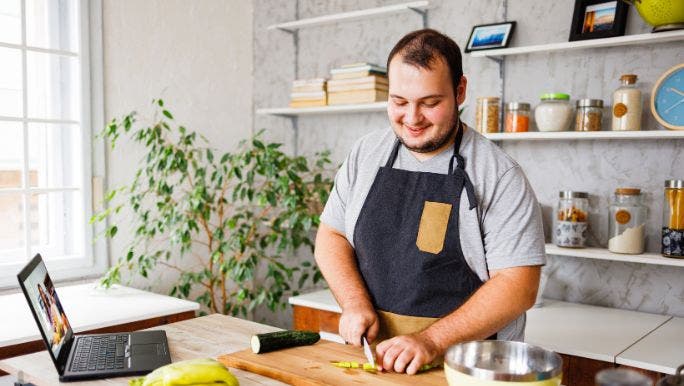Support your gut in 3 simple steps

Key Points
- Gut repair isn’t a one-size-fits-all process.
- Probiotics and changes to your diet and lifestyle may all help to repair your gut.
- Stress may have a significant impact on your gut health – be mindful of your stress levels.
Gut issues getting you down? An imbalance in your gut can cause problems ranging from gas and bloating to low moods and trouble sleeping. The good news is there’s a lot we can do to help support our gut health. In this article, we look at three simple steps that may help repair your gut, leaving you feeling healthier and more comfortable.
Is gut repair possible?
Many people ask whether it’s possible to repair your gut. The answer, according to Naturopath, Gabbie Watt, isn’t straightforward. She says, “It is possible to relieve symptoms caused by a problematic gut; however, depending on the type of condition and the individual, it may not resolve the underlying issue or cause.”
Gabbie shares, “Conditions like medically diagnosed irritable bowel syndrome (IBS), for instance, may not be cured entirely and require personalised management due to their varied causes and individual circumstances.”
The good news is that while it may be different for everyone, there are certain steps that you can take that may benefit the gut microbiome and, in turn, relieve symptoms. Always speak to your health professional to make sure you’re getting an accurate diagnosis.

Probiotics such as those found in yoghurt may help support gut health
Gut repair: 3 simple steps to follow
So you’re eager to take charge of your gut health, but where should you start? Here are three simple steps that may support you in your journey to repair your gut.
Step 1: Probiotics and prebiotics
Probiotics are often hailed as a powerful tool for promoting gut health. You may consider them as ‘good bacteria’ or microorganisms that work to restore balance within your gut’s microbial community. You can find probiotics in dietary supplements or probiotic-rich foods like yoghurt, kefir and kimchi.
A diet rich in prebiotics is another valuable step. “Prebiotics can be thought of as food for the gut,” says Gabbie, “feeding the existing gut bacteria. They have been shown to increase probiotic strains to aid in gut function and repair.” Foods containing prebiotics include asparagus, beans, onions, garlic and bananas.
Step 2: Dietary changes
What you eat plays a significant role in your gut health. So what are some changes you could make to your diet that may help? “Generally, crowding out any refined sugars and fried fatty foods is a good place to start,” Gabbie says. “Adding whole grains and colourful fruits and veggies that are high in antioxidants and contain anti-inflammatory properties, are beneficial for feeding all the good gut bacteria to help maintain a strong gut barrier.”
Step 3: Lifestyle changes
When it comes to gut health, getting a good night’s sleep is essential. Gabbie shares, “By creating a sleep-conducive environment, optimising your sleep temperature, and avoiding heavy meals close to bedtime, you’ll enhance your sleep quality, leaving you feeling more refreshed and invigorated.”
Stress is another piece of the puzzle.
High-stress levels may contribute to inflammation in your gut. Practises like yoga and mindfulness may help to reduce stress and may ease those unwanted symptoms.
Regular exercise is also crucial. “Physical activity has been shown to shift the gut microbiome towards the growth of beneficial bacteria that contribute to weight management, improvements in the immune system, and a reduction in gastrointestinal disorders,” Gabbie says.

Drinking alcohol may lead to unpleasant gut symptoms
What’s the biggest thing to avoid if you’re concerned about gut repair?
As well as the steps outlined above, there are certain things you may choose to avoid to support your gut healing. Gabbie shares, “Foods such as dairy, gluten, added sugar, fried food and spicy foods are known to further irritate the gut and lead to unwanted symptoms, but it’s important to understand that the foods affecting your gut can be unique to you.”
Stress has a part to play, as we’ve discussed, but there is also a well-established connection between alcohol and its effect on the gut microbiome, increasing inflammation and unwanted gut symptoms.
It’s a good idea to speak to a health professional to identify the specific triggers for your symptoms. They can help you determine the right dietary and lifestyle adjustments tailored to your unique needs.

Repairing your gut could take anywhere from 24 hours to several years
Is gut healing an expensive or time-consuming process?
Unfortunately, there isn’t a one-size-fits-all answer to this question. Different studies indicate it can be anywhere from a few days to years. Other studies show a shift in gut bacteria in as little as 24 hours with dietary changes.
“It will depend on individual circumstances and different needs,” shares Gabbie. “A problematic gut may be caused by a range of factors with different requirements for resolution or management. We can’t really define a ‘normal’ microbiome for the average human population, so a specific timeline for gut healing is hard to predict.”
Healthy gut, happy you
When it comes to gut healing, knowing where to start may feel overwhelming. If you’re concerned about your gut health, it’s best to visit a healthcare practitioner for personalised advice on what’s best for you and your gut.
Related:
- What are the best vegetables for gut health?
- Can gut health affect your skin?
- The interesting link between alcohol and gut health
Gabbie Watt is a Naturopath and is passionate about blending evidence-based practice and traditional natural medicine into her approach. With experience previously working as a Radiation Therapist, Gabbie’s professional background in conventional medicine has been instrumental in shaping her holistic approach to health.
Reviewed by the Healthylife health experts November 2023.
This article is for informational purposes only and does not provide medical advice, diagnosis or treatment. Any information published on this website or by this brand is not intended as a substitute for medical advice. If you have any concerns or questions about your health, you should consult with a health professional.